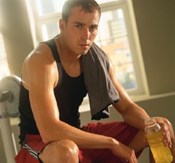Should you drink a sports drink if you engage in regular physical activity?
Sports drinks are popular, you see them at the gym, in vending machines, and at convenience stores. Sports drinks contain flavorings, carbohydrate (usually in the form of high fructose corn sweetener) and electrolytes. They are formulated to replace fluids, electrolytes and carbohydrates during times of intense activity. The carbohydrate in sports drinks provides energy to working muscles so that activity can continue. Sports drinks are flavored which encourages consumption so the athlete can fully rehydrate. There is ample research to suggest that athletes participating in competition, workouts or training for 60 minutes or longer and/or in hot climates or at high altitudes benefit from sports drinks.
What about after your nightly workout or afternoon mowing the grass? Do you need sports drinks to stay hydrated?
Since the early days of Gatorade, sports drinks have moved from the locker room to the mainstream. Today athletes and non-athletes drink sports drinks. There is no evidence to support the use of sports drinks for athletic events or bouts of physical exertion of less than 60 minutes. Certainly, sports drinks are not appropriate for those not engaged in athletics or manual labor. At about 100 calories for 16 ounces, sports drinks do have less sugar and calories than other soft drinks. However, they still contain substantial calories and no redeeming nutritional qualities. In other words, for the non-athlete, they are not much better than drinking soft drinks. There are several sports drinks on the market that are sweetened with artificial sweetener or contain less caloric-sweetener than regular sports drinks. These may be good alternatives for athletes who want to watch their calorie intake.







